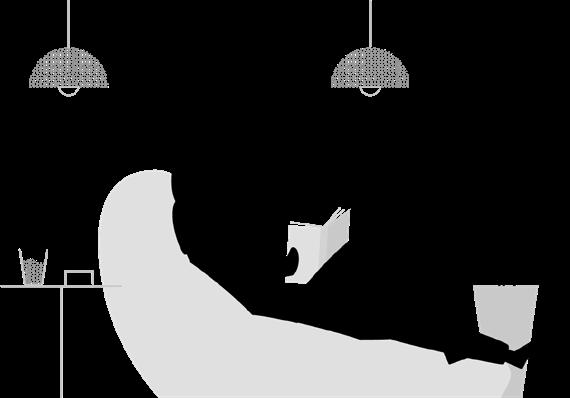
4 minute read
SCU Showcase
A showcase of SCU student work, compiled by Dr Emma Doolan
Requiem
Advertisement
Samantha Cambray
When we understood that overpopulation was going to end us, death became more revered. We moved from investing billions into medicines and keeping elderly folk comfortable and sedated. We looked to the joyous funerals of the Balinese; the fires of Varanasi. Death returned to a focal point of life. Yesterday, my social standing lifted: such was my brother’s sacrifice. Conscripted into farm work after the collapse of industrial agriculture, he was bitten by a brown snake whilst building irrigation channels. First aid is taboo now – he died in that field in a valley once lush with rainforest. I slept poorly overnight. Did the venom in his veins make his last minutes transcendent? Did he witness his spirit moving from the earth? Or did he only writhe with pain and fear and the heat of summer?
*** I drop the shovel beside my collapsing body. My skin has stopped sweating, instead, the soft flesh of my kidneys feel arid and as tough as the soil. The funeral pyres of winter are too much a risk of wildfire, so all other deaths are buried. When the old town cemetery filled, the sports fields were opened for burials. Sweaty men play cricket in their greys next to families picnicking with their dead. Children run between colourful graves, whilst as a community we remember
how to talk again, talk that spans a whole afternoon. If there is an interment, everyone on the field takes their knee while family sing their loved ones into the handdug earth. My brother’s body lays on a bamboo stretcher close by me, all but his face covered in flowers, a few coins and the choicest vegetables. I crave their taste. His co-workers keep digging, their conscripted bodies stronger. Shame in my incomplete digging festers, until it reforms as the urge to grieve like in my parents’ day: in private, breath-depriving sobs bearing the reality of loss. The bond with my brother, as it stood, is forever arrested. And more threateningly: I too am mortal. Our family line stops with me. They tested me when I started menstruating. My genes weren’t strong enough to avoid a governmentally prescribed hysterectomy. Few women have the genes. I’ve heard rumours of whole communities fled to the bush, where their elderly live to old age, where they give birth to as many children as they conceive. I don’t know if the rumours are true.
Samantha Cambray is a mother of four children and lives in the lush Thora Valley of northern New South Wales. She is a Creative Writing student at Southern Cross University and is currently exploring potential cultural and sociological shifts brought about by climate change in her work, which spans both fiction and non-fiction.
A South Australian tale
Peace By Garry Disher
Review by Colleen O’Brien
I have to confess up front – I’m a Garry Disher fan. Especially his Peninsula Crime and Bitter Wash Road series. Book two of the Bitter Wash Road series is Peace and follows Bitter Wash Road (aka Hell to Pay). The main protagonist is Constable Paul Hirschhausen – nicknamed Hirsch – who runs a one-man police station in a small town south of the Flinders Ranges in South Australia. At first, I wasn’t sure I liked this novel, but I persevered and am so pleased I did. Peace is like one of those super-realistic photographic paintings you come across in art galleries. At first it looks simple, maybe even boring, but when you stand closer you finally get it as you perceive the incredible detail and small strokes taken to create the image. There are no large brush strokes in Peace – it is all in the detail and the slow build towards the realisation that there is a cohesive picture being portrayed. Constable Hirschhausen is dogged, even a little dull. But his doggedness pays off both in the plot and in the depiction of his character. Although Peace deals with a number of crimes committed by myriad people, I feel its main focus was on police culture. Hirsch navigates this culture expertly and quietly. And that is where I realised he isn’t dull so much as quiet and relentless – and moral. Morality plays a large role in Peace – the morality, or lack thereof, of the townspeople, police and Hirsch. Murder is the major crime in Peace and is woven into the story with the crimes of cruelty to animals, drug dealing, domestic violence, police corruption and theft. All of these converge and form a pattern – and they all have a local man sitting and watching. The spider at the centre of the web. Hirsch spends hours travelling the dusty back roads of his district and turning up to answer questions from superior officers in Adelaide. Questions that show his commanding officers don’t understand the role of a country cop include, ‘How to explain that a country copper is always on duty? That an eight-hour shift is meaningless in the bush?’ Unlike city detectives, he has to not only carry out day-to-day policing, but investigate a variety of crimes from the trivial to the serious. An example of Disher’s style comes when Hirsch finds a driver in a crashed vehicle. ‘You’d think: surgeon on his day off; film producer scouting locations. You’d also think he’d been shot. A large exit wound behind his left ear was seeping blood.’ He doesn’t have a racy style in Peace and Bitter Wash Road, unlike his Wyatt series, but he has great moments of cynicism and humour. He understands his characters and depicts them in detail through their actions and interactions. Also, unlike Jane Harper, Disher doesn’t write the countryside as a character, but portrays it as an unrelenting canvas. Peace is a slow burn, but well worth the read.









